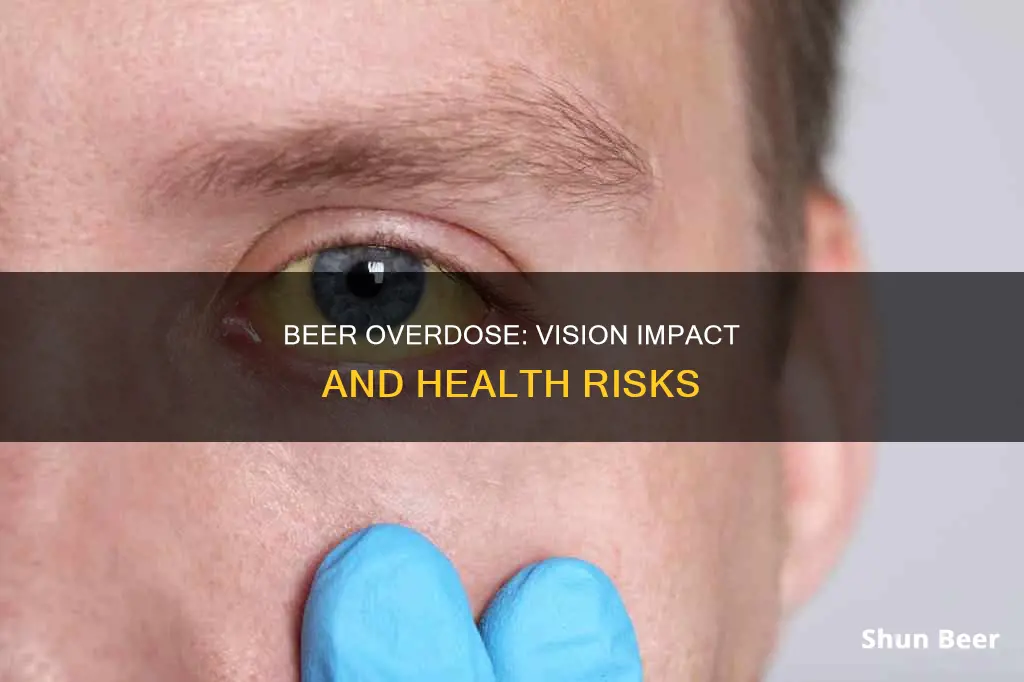
Alcohol can affect your body in many ways, and even one or a few drinks can cause blurred vision, slurred speech, slowed reactions, and memory loss. Excessive drinking can cause permanent eye damage, including involuntary rapid eye movement, double vision, decreased reaction time of pupils, and impaired ability to see colour shades. Heavy drinking can also cause bloodshot eyes, as alcohol dilates ocular blood vessels, making them look larger and redder. In the long term, excessive drinking can lead to permanent loss of vision or blindness, known as toxic amblyopia, as well as an increased risk of developing cataracts.
What You'll Learn

Involuntary rapid eye movement
Drinking too much beer can indeed affect your eyesight. Even a single drink can cause blurred vision, along with other side effects like slurred speech and slowed reactions. Excessive drinking can lead to permanent eye damage and involuntary rapid eye movement.
Alcohol consumption can lead to rapid eye movement by causing interference between the brain and the eyes. It can also damage or accelerate the ageing of structures inside the eye, such as the lens, retina, and optic nerve. Specifically, alcohol can cause muscle weakness in the eyes and permanent damage to the optic nerve, which transmits visual images to the brain. This damage can slow down communication between the eyes and the brain, leading to blurred or double vision, decreased reaction time of pupils, and impaired ability to see colour shades.
In addition to these direct effects on the eyes, alcohol also affects the central nervous system, which can alter cognitive and perceptual processes related to eye movement control. For example, alcohol can cause a decrease in the activity of GABA, the main inhibitory neurotransmitter in the brain, which is involved in controlling ocular movement.
Treatment and Prevention
Treatments for eye issues related to alcohol consumption vary depending on the specific symptoms and underlying conditions. These may include corrective lenses or glasses, eye drops for bloodshot eyes, or surgery to correct head tilt associated with nystagmus. However, prevention is the best way to avoid eye problems caused by alcohol. This can be achieved by limiting alcohol consumption, avoiding triggers, tracking drink intake, and seeking support from friends and family.
Craft Beer: Drinking Past the Sell-By Date
You may want to see also

Neurological disruptions
Excessive alcohol consumption can cause neurological disruptions that affect your eyesight. These disruptions occur because alcohol slows down the communication between the eyes and the brain. This can lead to several issues, including:
Double Vision
Also known as diplopia, double vision is a common side effect of drinking too much alcohol. It occurs due to the slowed communication between the eyes and the brain, resulting in a person seeing two images instead of one. This can be temporary, typically wearing off as the person sobers up or the next day.
Blurred Vision
Alcohol can cause blurred vision, which is often associated with high BAC (Blood Alcohol Concentration) levels. At a BAC of 0.08%-0.09%, which is above the legal limit for driving in most states, blurred vision is a common symptom, along with loss of physical coordination and slurred speech.
Decreased Reaction Time of Pupils
Alcohol slows down the reaction time of the pupils, affecting their ability to constrict or dilate properly. This condition is known as mydriasis and can impact the ability to see different shades of colour, particularly when driving at night. It can also lead to tunnel vision and difficulty adjusting to changes in light, such as oncoming headlights.
Involuntary Rapid Eye Movement
Prolonged alcohol use can cause involuntary rapid eye movement, also known as nystagmus. This is a condition where the eyes move quickly and involuntarily in a back-and-forth motion. It is a result of compromised function between the brain and the eyes, where messages are not sent or received correctly.
It is important to note that while most short-term eye conditions caused by alcohol consumption will improve once the body rebounds from alcohol exposure, chronic and excessive alcohol abuse can lead to long-lasting or even permanent eye damage. Therefore, it is crucial to consume alcohol in moderation or abstain from it altogether to protect your eyesight and overall health.
Old Beer: Is It Safe to Drink After a Decade?
You may want to see also

Optic nerve damage
Alcohol abuse can lead to optic nerve damage in several ways. Firstly, alcohol weakens the eye muscles, which can have a permanent impact on the eyes and damage the optic nerve. Secondly, alcohol slows down communication between the optic nerves and the brain, causing blurred or double vision. This slowed communication can also lead to a decrease in the reaction time of the pupils and impair colour perception.
In addition to the direct effects of alcohol on the optic nerve, alcoholism is often associated with nutritional and vitamin deficiencies, particularly vitamin B12 deficiency. These deficiencies can further contribute to optic nerve damage. Alcohol abuse can also cause bloodshot eyes, as it dilates the ocular blood vessels, making them look larger and giving the eyes a reddish colour.
The effects of alcohol on the optic nerve can be gradual, and early signs may include blurriness in the central visual field, followed by reduced visual acuity. It is important to note that the loss of vision caused by optic nerve damage is usually painless and can affect both eyes, although it may be more predominant in one eye initially. If alcohol consumption is not stopped, the damage to the optic nerve can become permanent, and the entire nerve may become atrophied, resulting in irreversible vision loss.
To prevent optic nerve damage, it is crucial to limit alcohol consumption to moderate levels and address any nutritional or vitamin deficiencies. Early intervention and dietary improvements can help to recover optic nerve function and prevent permanent vision loss.
Beer and Dark Stool: Is There a Link?
You may want to see also

Dry eye syndrome
A study by Yong-Sheng You, Nai-Bin Qu, and Xiao-Ning Yu published in the International Journal of Ophthalmology in 2016 found that alcohol consumption may be a significant risk factor for dry eye syndrome. The study, which analysed 10 previous studies, found that alcohol consumption would significantly increase the risk of dry eye syndrome and that any drinkers were at higher risk of suffering from the condition than non-drinkers. The study also found that heavy drinkers did not have a higher risk of dry eye syndrome, which may be due to alcohol-induced peripheral neuropathy reducing corneal sensitivity and leading to an underestimation of the incidence of dry eye syndrome.
Another study, published in the Cornea journal in 2013, found that heavy drinking can lead to decreased tear-film volume, disturbed tear-film structure, a facilitated aqueous layer, and a deteriorated tear film. This can result in dry or irritable eyes and impact vision.
It is important to note that while alcohol consumption may increase the risk of dry eye syndrome, it is not the only factor contributing to the condition. Other factors such as age, gender, contact lens use, and hormone replacement therapy may also play a role.
Valerian Tea and Beer: A Safe Mix?
You may want to see also

Nutritional optic neuropathy
The deficiencies of vitamin B12, folic acid, thiamine, and copper are rare in developed countries, but they are becoming more common due to the popularity of bariatric surgery and vegan diets. In low- and middle-income countries, inadequate food intake is the main cause of nutritional optic neuropathy.
The diagnosis of nutritional optic neuropathy may be missed or attributed to a single deficiency when a multifactorial etiology is responsible for the optic damage. It is important to exclude heredodegenerative optic neuropathy by testing for the most common mutations of Leber’s neuropathy and autosomal dominant optic atrophy, as a micronutrient deficiency may trigger these genetic optic neuropathies. It is also important to exclude a toxic etiology, such as alcohol, tobacco, or drugs.
The mainstay of treatment for nutritional optic neuropathy is supplementation therapy. It is important to identify which nutrients are deficient and to set up a proper supplementation regimen.
Beer Drinking: Is Three-a-Night Habit Bad for Health?
You may want to see also
Frequently asked questions
Yes, drinking too much beer can affect your eyesight in several ways. Even a few drinks can cause blurred vision, along with other side effects like slurred speech and slowed reactions.
Some short-term effects of drinking too much beer include involuntary rapid eye movement, blurred or double vision, decreased sensitivity to contrasting colours, and slower pupil dilation.
Long-term excessive drinking can lead to permanent damage to the optic nerve, which may result in alcohol-related blindness. It can also cause eye floaters, cataracts, and age-related macular degeneration (AMD), which contributes to legal blindness in older adults.
Reducing or eliminating alcohol consumption is the best way to alleviate eye-related symptoms and prevent long-term damage to your eyesight. Light to moderate alcohol consumption is not expected to have a lasting impact on your vision.







